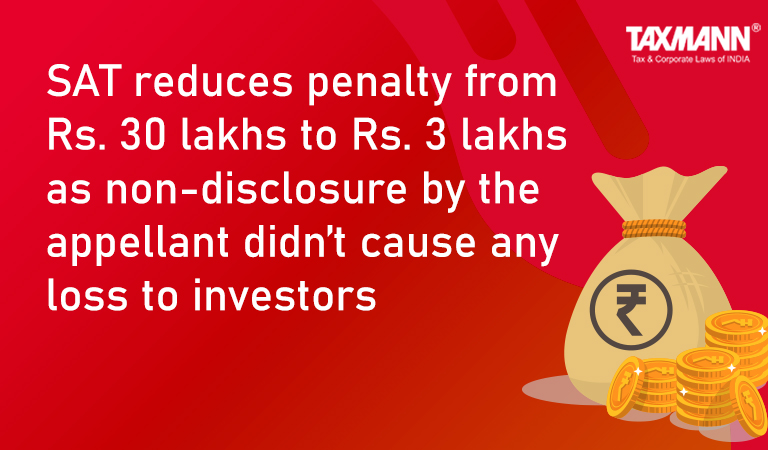SAT reduces penalty from Rs. 30 lakhs to Rs. 3 lakhs as non-disclosure by the appellant didn’t cause any loss to investors
- Blog|News|Company Law|
- 2 Min Read
- By Taxmann
- |
- Last Updated on 23 November, 2021

Case Details: Aanchal Jindal v. Securities and Exchange Board of India - [2021] 132 taxmann.com 122 (SAT - Mumbai)
Judiciary and Counsel Details
-
- Justice Tarun Agarwala, Presiding Officer
- Vikas Bengani, Adv. for the Appellant.
- Vyom Shah, Ravishekhar Pandey and Ms. Prerna Sharma, Advs. for the Respondent.
Facts of the Case
Pursuant to an investigation by SEBI, it was found that appellants were promoters of a company. A show-cause notice was issued alleging that the appellant as a promoter failed to make disclosures of the changes in the shareholdings in the scrip of the company in accordance with the disclosure requirements under the PIT Regulations and SAST Regulations.
It was noted that the appellant failed to reply to SCN. Since no reply was filed, the AO imposed a penalty of Rs. 10,50,000/-, Rs. 9,00,000/-, Rs. 11,50,000/-, Rs. 12,00,000/- against appellants. On the other hand, appellants contended that they were under a stress concerning the divorce proceedings of Aanchal Jindal (one of the appellants) and other criminal cases & therefore could not file any reply.
However, Appellants stated that some of the transactions were made to the broker to transfer the scrip as security towards margin money and therefore there was no change in the beneficial ownership of the scrip.
It was also mentioned by appellants that inter-se transactions between the promoters were made and therefore the question of any loss to the investors does not arise as the shareholding of the promoter and promoter group remained the same. They prescribed that the quantum of penalty imposed on a technical violation was harsh, arbitrary, and disproportionate.
SEBI specifies that the contention by appellants that some of the transactions were only inter-se transfers between the promoters and therefore such transactions could not be taken into consideration is erroneous in as much as all the transactions whether from one promoter to another promoter was still required to be disclosed under the aforesaid Regulations.
SAT Held
The Tribunal believes that the penalty imposed is excessive and considering the factors taken into section 15J especially the finding that there has been no disproportionate gain made by the appellants while undertaking the transactions in the shares of the Company nor such transactions has caused loss to any of the investors.
Therefore, while affirming the findings of violation insofar as it related to non-disclosure, a penalty of Rs. 30 lac was to be reduced to Rs. 3 lac each on the appellants for violations of sections 13(4A) and 13(5) of the PIT Regulations and 29(2) and 29(3) of the SAST Regulations. The said amount shall be paid by each of the appellants within four weeks.
Disclaimer: The content/information published on the website is only for general information of the user and shall not be construed as legal advice. While the Taxmann has exercised reasonable efforts to ensure the veracity of information/content published, Taxmann shall be under no liability in any manner whatsoever for incorrect information, if any.

Taxmann Publications has a dedicated in-house Research & Editorial Team. This team consists of a team of Chartered Accountants, Company Secretaries, and Lawyers. This team works under the guidance and supervision of editor-in-chief Mr Rakesh Bhargava.
The Research and Editorial Team is responsible for developing reliable and accurate content for the readers. The team follows the six-sigma approach to achieve the benchmark of zero error in its publications and research platforms. The team ensures that the following publication guidelines are thoroughly followed while developing the content:
- The statutory material is obtained only from the authorized and reliable sources
- All the latest developments in the judicial and legislative fields are covered
- Prepare the analytical write-ups on current, controversial, and important issues to help the readers to understand the concept and its implications
- Every content published by Taxmann is complete, accurate and lucid
- All evidence-based statements are supported with proper reference to Section, Circular No., Notification No. or citations
- The golden rules of grammar, style and consistency are thoroughly followed
- Font and size that’s easy to read and remain consistent across all imprint and digital publications are applied



 CA | CS | CMA
CA | CS | CMA
